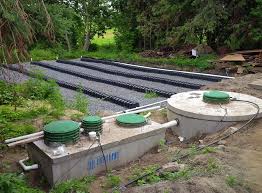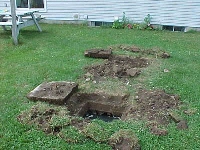Wells and Septics
Septic Reinspections
Currently (2024) only Tay Valley Township has a Mandatory Septic Reinspection Program in place for Otty Lake. Drummond/North Elmsley (D/NE) does not. Tay Valley has the the authority to require a re-inspection take place on systems older than nine years. Once all the systems are inspected, they will be reinspected on a ten year cycle.
 Voluntary Reinspection Programs
Voluntary Reinspection Programs
Both townships started out with voluntary septic reinspection programs. Tay Valley started with a pilot reinspection program on Christie Lake in 2000, which was expanded to a voluntary reinspection program for all lakes in their jurisdiction. In 2012 a pilot mandatory inspection program was initiated for Otty and six other lakes.
Drummond/North Elmsley (D/NE) Township and the Leeds, Grenville and Lanark Health Unit established a voluntary septic re-inspection program for Otty Lake shoreline properties in 2008. In 2009, the Mississippi Rideau Septic System Office began to conduct the D/NE re-inspections. The D/NE Township Septic System Re-inspection Program became mandatory in 2012. The last round of Reinspections on Otty Lake was in 2019, when 30 properties were inspected.
Read more in our February 2020 newsletter.
 It has taken a number of years to complete this important program. The commitment of Tay Valley Township and Drummond/North Elmsley is greatly appreciated.
It has taken a number of years to complete this important program. The commitment of Tay Valley Township and Drummond/North Elmsley is greatly appreciated.
What We Have Done and Learned. A presentation by Eric Kohlsmith at a Septic Savvy workshop in 2012, an inspector with the Mississippi Rideau Septic System Office, on the voluntary septic inspections in Tay Valley, Drummond North Elmsley (Otty Lake), Rideau Lakes, and North Frontenac and Central Frontenac up to 2011.
Tay Valley Results. You can read past annual reports of the Tay Valley Sewage System Re-Inspection Program on the Tay Valley website.
Septic Systems
Septic systems are a good way to treat waste – as long as they function properly. Faulty septic systems can be extremely hazardous since improperly treated effluent can affect your well, your neighbour’s well, the shoreline environment and lake water quality. The maintenance and care of your septic system is your responsibility, so if you notice a problem, deal with it right away for the sake of everyone’s health.
Avoiding Problems and Dangers
1. Regular Pumpouts. Most system failures occur because the tank wasn’t pumped often enough. Depending on the use and size of your septic system, you should have your system pumped every 3 to 5 years.
2. Regular Inspections. Inspect your system regularly. A good opportunity is when the tank is being pumped out. Ask for help if you are unsure or unable.
3. Protecting the Leaching Bed. Avoid compacting the soil (e.g. by cars), over saturating the leaching bed by watering, and keep trees with creeping roots well away.
4. Control Inputs. Control the volume and type of liquids and solids entering the system.
Install water-saving devices.
Practice water saving techniques
Choose environmentally friendly cleaners over chemicals.
Reduce the amount of solids going in. Do not use it as a trash cash, it is for human waste only
Additives such as starters, feeders and cleaners are not effective.
Read more about the importance of septic systems to Otty Lake in the Otty Lake Shoreline Handbook beginning on page 25. Every residence was supplied this binder in 2010.
Approvals Process
If you are planning to install or replace a septic system, it must meet requirements outlined in the Ontario Building Code, and an approval from your township must be obtained prior to the installation of the system. Once completed the septic system must be inspected before filling takes place. It is suggested that you contact your Municipal Office at the beginning of your project and they will direct you through the appropriate steps. Otty Lake lies within both Tay Valley and Drummond/North Elmsley Townships.
The Ontario Building Code also sets out minimum distance requirements for the installation of a system. Most new septic systems on new building lots are now required to be installed 30m from open water (such as a lake or river). They must be a minimum of 15m from your drilled well and 30m from a dug well. They must also be at least 5m away from a swimming pool or vegetable garden.
Well Water Testing
If you get your drinking water from a well, it is important that you take the responsibility for testing that water regularly. Free well water testing is a program offered by Public Health Ontario and facilitated by the local Health Unit.
 The Leeds, Grenville and Lanark District Health Unit is working to encourage well water testing. With the help of partners, the Health Unit is able to offer several sites in addition to their Health Unit locations for bottle pick up and sample drop off.
The Leeds, Grenville and Lanark District Health Unit is working to encourage well water testing. With the help of partners, the Health Unit is able to offer several sites in addition to their Health Unit locations for bottle pick up and sample drop off.
The dropoff locations closest to Otty Lake are:
The Smiths Falls Health Unit Office, 25 Johnston St., Smiths Falls Phone 613-283-2740. Dropoff Hours: Monday – Thursday 8:30 a.m.- 4:30 p.m. (closed 12:00 – 1:00 p.m.)
The Office (an office supply store), The Office 11 Wilson St. E, Perth Dropoff Hours: Monday – Thursday 9:00 a.m, – 4:00 p.m.
Country Roads Community Health Centre, 4319 Cove Rd (just off of Hwy. 15), Portland. Dropoff Hours: Monday to Thursday, 8:30 a.m. – 4:30 p.m.
Note that samples cannot be dropped off on Fridays, as they need time to get them to the lab before the weekend. Samples should be kept cool and dropped off within 24 hours.
Sample bottles may be obtained at the above locations or at the municipal offices of Tay Valley or Drummond North-Elmsley.
See a full list of LLG dropoff locations.
See how to take an accurate well water sample.
For more information about well water testing, call the Health ACTION line at 1-800-660-5853 or 613-345-5685 or visit the Health Unit’s website.
For more information on wells, see the Well Aware program website.
More on Septics
Soil Matters!
The role soil plays is a vital one; 40% of the wastewater treatment happens in the septic tank, but the remaining 60% of the treatment happens in the soil.
MVCA Sewage System FAQ
Prepared by Eric Kohlsmith (Upper Watershed Regulations Inspector) as a followup to the June 2017 field trip to the Septic Systems Demonstration Site at the Baxter Conservation Area. Questions can be directed to Eric at [email protected] or by telephone at RVCA at 613 692 – 3571 ext. 1153. 11 page PDF.
More About Septic Systems
Need a little bit more detail? See a presentation by Terry Davidson of the Ottawa Septic Office, presented at a Septic Savvy Workshop in 2012. Good photos!
Municipal Amalgamations 1998
The Otty Lake watershed lies within the former municipalities of North Burgess (which amalgamated with South Sherbrooke and Bathurst Townships to form TVT) and North Elmsley (amalgamated with Drummond Township to form D/NE).


Are septic systems new to you?
Familiarize yourself with your septic system before there is a problem. The RVCA has an illustrated primer for the uninitiated
Read Septic Smart Book 1
Book 2: Advanced Treatment Systems